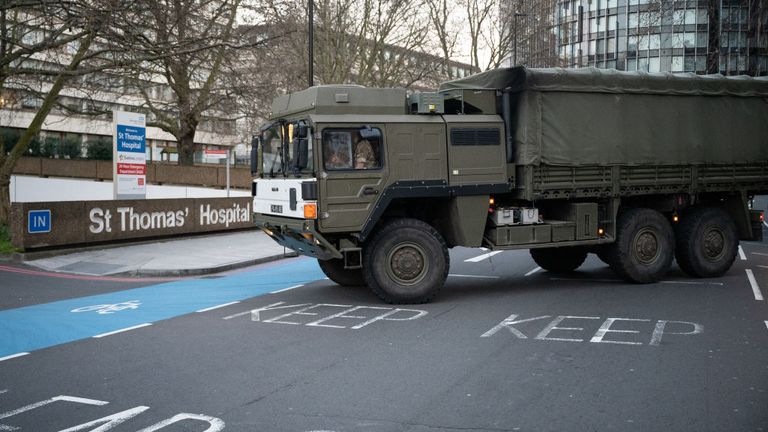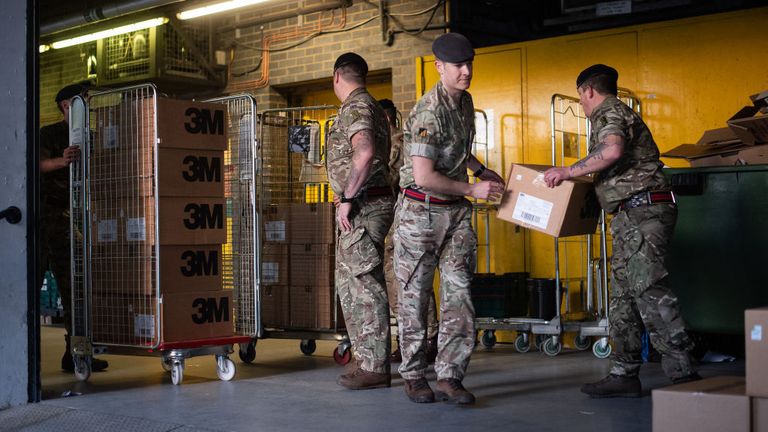Coronavirus: Armed forces rapidly expand their response to COVID-19
The armed forces’ response to the coronavirus crisis is rapidly expanding with the Ministry of Defence revealing more than 2,680 personnel are already deployed around the country.
Thousands more are on standby.
From building hospitals and driving ambulances, to assisting government departments and even purchasing ventilators, the range and scale of the operation is unprecedented.
And it is happening at the same time as the military carries out its core function of defence and security – an area that officials say has not been affected by the hospitalisation of Boris Johnson, who as prime minister has ultimate responsibility for national security matters.
Instead that authority would in his absence pass to Dominic Raab, the foreign secretary, who is deputising for him, and the cabinet, according to the prime minister’s spokesman.
General Sir Nick Carter, the head of the armed forces, has said there remained a “very clear” chain of command.
“We’re pretty confident that it’s business as usual as far as the operations are concerned,” he said in an interview on BBC Radio 4’s Today programme.
By far the biggest operation is the response to COVID-19, with 76 requests so far for assistance from government ministries and local authorities.
Military activities include:
- Freeing up more than 2,300 vehicles to be used by troops in 34 locations nationwide as temporary ambulances and to deliver food and other equipment
- Using the branch of the Ministry of Defence that normally procures equipment for the armed forces to purchase ventilators for the NHS.
- Defence Equipment and Support is drawing on its ability to rearm at speed in a war to help doctors fight the virus
- Helping to turn several sites into temporary Nightingale hospitals, starting with the giant ExCel Exhibition Centre in London but also including constructions in Glasgow, Birmingham, Manchester, Cardiff and possibly Farnborough in Hampshire
- Building five temporary patient recovery centres in Cumbria, with 500 beds for patients discharged from hospital but not well enough to return home
- Assisting in setting up coronavirus test centres, such as in Nottingham and at the Chessington World of Adventures theme park.
- Troops are transporting testing equipment to laboratories and delivering protective equipment to hospitals
- Freeing up parts of the defence estate to be used as temporary mortuaries for coronavirus victims. This includes an aircraft hangar on a base in Scotland and two vehicle hangars on a base in Northern Ireland
- Scoping out using parts of the defence estate to house hundreds of low risk prisoners
- Flying coronavirus patients across the UK to hospital; helping the foreign office to repatriate British nationals stuck overseas
- Supporting Britain’s overseas territories, including by sending additional military kit and medics to the Falklands and a Royal Fleet Auxiliary support ship to the Caribbean as part of hurricane relief duties
The Headquarters Standing Joint Command in Aldershot is running the military’s coronavirus response, led by Lieutenant-General Tyrone Urch.
In terms of size alone, it is gearing up to be the largest mobilisation within the UK in decades, with 23,000 servicemen and women being assembled as part of what is being called the COVID Support Force.
But military chiefs are mindful that they are supporting, rather than heading, the effort, with the civilian authorities in overall charge even though the armed forces often bring the greater experience of crisis management, according to defence sources.
“Humble education has gone on,” a senior defence source said, describing the need to assist local authorities and central government ministries without appearing to take over.
“People (in civilian organisations) do not want to be seen as failing.”
Dozens of military advisers and planners are embedded at the heart of the UK’s civilian COVID-19 response, including at the Department of Health and Social Care, where the source said they had become “indispensable”.
Military personnel are also assisting at the Cabinet Office and the Ministry of Housing, Communities and Local Government.
Dozens more soldiers, sailors and airmen with expertise in planning have also been deployed across the country to support 38 local resilience forums, which head the preparations and the execution on the ground of the coronavirus response.
General Sir Nick Parker was in charge of the last mass mobilisation within the UK of military personnel in support of the government.
It was during the 2012 London Olympics when almost 20,000 servicemen and women helped to provide the security.
He told Sky News: “I just know they’ll be working in support of the NHS to pick-up those things that appear at the last minute, that need somebody to react quickly to deal with, and they will do it … with no fuss, they will get it done because it is in their DNA.”
Officers assess multiple requests for help from local authorities and government departments.
Source: Read Full Article




